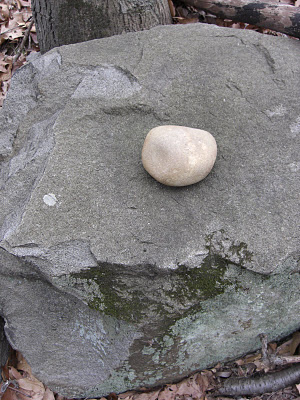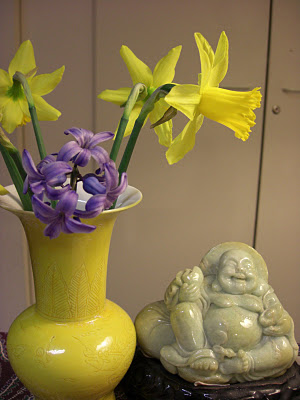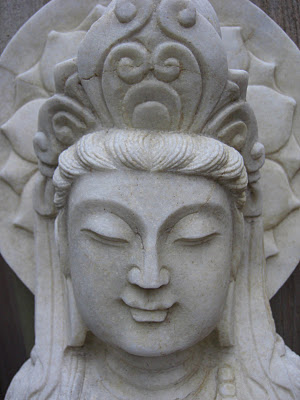 For those of you not familiar with North American birds, this is a wild bird, not a domesticate; a wood duck. There's a couple nesting across the street from my house on the Sparkill pond; this photograph of the male was taken this morning.
For those of you not familiar with North American birds, this is a wild bird, not a domesticate; a wood duck. There's a couple nesting across the street from my house on the Sparkill pond; this photograph of the male was taken this morning.In examining all the questions about life, I have pointed out on a number of occasions that the only thing that seems absolutely certain at any given moment is that we inhabit the body we inhabit, and have the experiences we experience.
Attempting to interpret these facts, to insert them into cosmologies, intellectual structures, to manufacture meanings comes after the fact.
It seems as though the human mind has a obsessive need to meddle with everything. Some Zen masters discuss the conceptual mind with undisguised contempt ...as though we ought to stomp it out like a fire ...and there are times when I completely agree with them.
The summary of our experience is impressions. Impressions are the collective records of all our sensory foods, as acquired by all of our sensory organs.
If we choose to be sensitive to our life, rather than accepting the insensitivity we usually default to, we may notice that all of these things we call impressions are food. The body we inhabit is constantly drinking in life from every direction and with every sense, both inner and outer. This feeding on what is taking place never ends. Whether we are conscious of it or not, every bit of life, every moment we encounter, every sound we hear and touch we sense is food.
Mankind evolved to take in impressions of the natural world. (This isn't my idea; it's taken from the Nobel prize-winning biologist Edward O. Wilson.) And no matter what cosmology, religious practice, or science we choose to sign onto, this particular fact seems self-evident. It isn't possible for men to have evolved in any other way, no matter what we have since appended to the situation with our artifice and technology.
The conditions of modern life have caused a great deal of what we eat in terms of impressions to deteriorate. To be sure, we have created a lot of wonderful and interesting impressions along the way, especially those that emerge from the arts. The fact remains that an overwhelming number of the urban and technological impressions we are inundated with probably have a debilitating effect on us. Edward O. Wilson argues that a failure to take in a sufficient amount of natural impressions leads to a form of psychopathy. Given the current state of society at large, I'd say this might well be true.
Men who attempt to refine their inner state have long understood that surrounding ourselves with intentionally chosen, more feeding impressions can help us. This is the whole point of creating pleasing environments. It's the point of Zen gardens; it's the point of a Botticelli painting, and the point of a Beethoven symphony or a Mozart sonata. In the end, every single one of these enterprises, no matter how we try to interpret it, ends up being about how we feed ourselves.
If we don't feed ourselves the right kind of food in life -- and it is very important for us to remember that this has to do with all kinds of impressions-- we get sick. A lot of our emotional disabilities arise from this failure to feed ourselves properly. When we don't get the right foods, we don't manufacture the right chemicals; and, as modern pharmacology has conclusively proven, when we don't have the right chemicals in our body, our emotional equilibrium suffers.
Correcting this with little colored pills can help--and by all means, if that's necessary, no one should hesitate, because the stunning advances in medicine over the last 20 years ensure that there is no need to go through life as an emotional wreck anymore! --, but it's not the optimum solution.
Those of us who work in the spiritual territory of life want to learn how to put ourselves together by creating our own inner chemical support, as much as possible.
The point of inner work is to become more responsible to our impressions in a general way. This means we try to discriminate more actively as to how we are, where we are, and what we are encountering. Above all, we begin to learn that discrimination does not just mean filtering out the "bad" impressions; no, discrimination means choosing to be present to all the impressions, to suffer ourselves, that is, to allow all of the impressions we possibly can to enter us in a whole, merciless, and uncompromising manner, so that they touch as many parts of us as possible.
It's this willingness to be touched, to remain a bit quieter and allow the world to come to us, rather than reaching out to seize it, that makes the difference. This reminds me of a pillow one of my best friends gave me on my 50th birthday.
On it, she embroidered, "By absence of grasping, one is made free."
This act of trying to receive is part of that effort. Nowadays, I try to make sure that I have small things around me every day that create specifically feeding impressions: in this way, I try to be a bit more intentional about my environment. For example, I may bring a few flowers to work; I always have fossils, mineral specimens, gemstones on my desk, along with some Buddhist statuary. I make sure that I drink a good cup of coffee, made with the best possible beans, and a dollop of rich cream.
One could argue that I am spoiling myself, stroking my ego with these little things, and perhaps that is true in one way or another. But if I do not give myself impressions of value, then I do not value myself. I need to have some tangible, intentionally acquired impressions of fineness every day, some physical reminders of the fact that I am very fortunate to be in this body. Physical reminders of the fact that I live all an extraordinary planet, where beauty is all around me in ways I constantly forget and probably cannot even imagine.
Be nice to yourself.
This is a lesson my teacher brought to me in a very simple way when I first got sober over 26 years ago, and in one way or another, it has never left me. Even now, when I am still quite a different person than I was then, her words are true. The nature of their truth has transformed itself into a different level of understanding, but Truth itself remains, no matter what level I am able to take it on.
And Truth, like all other impressions, is like this. It is a wine that grows finer with age.
May your roots find water, and your leaves know sun.

















